House of Lords Statistics in 2022
The term ‘How to become a Lord’ is searched online approximately 100,000 times a year. Almost a third of these searches come from the UK. But just how does one go about obtaining a grand title such as this? And which types of individuals amongst us, the Great British public, are statistically most likely to become a Lord?
Well, you’d be forgiven for thinking that you’d just have to be rich – particularly given that in previous years, researchers have found a significant relationship between donations and nominations for these titles. However, for those of you pondering, we thought we’d find out once and for all, what it really takes to be awarded a place in the House of Lords.
To do this, we snooped at some demographic data from the prestigious House of Lords, to discover just how likely the average Joe is to be bestowed with this honourable title.
Our research found that the House of Lords is mostly made up of…
71 year old London-born Conservative-voting men named David or John Smith who went to private schools, are married with 2 children and have a university degree.
Now, that’s excellent news for approximately 0.0001% of the population. Congratulations to all the Johns and Davids out there who fit the bill. Now all you need to do is form an orderly queue outside the House of Lords and someone will be along shortly to welcome you in with a cup of earl grey tea and some supper*.
*Please note – This is (sadly) not true and we don’t actually recommend doing this.
House of Lords Composition in 2022
So what are the chances of your average person becoming a Lord? People who are younger than 71, women, single people, those who went to state schools, those born outside of London and those who have more or less than 2 children?
If any of the above apply to you, or your name doesn’t happen to be John or David Smith – don’t despair. We’ve delved into the demographic breakdowns of the current members of the House of Lords to help you discover exactly how likely you are to become a Lord, Duke, Baroness, Viscount, Marquess or Earl.
Key House of Lords Demographic Statistics
In short, our key findings are as follows:
- 3 in every 4 Lords are men.
- The average Lord is 71 years old.
- The most common first names of Lords are John and David, with the most common surname being Smith.
- 86.4% of members are born in the UK and more are born in London than any other city.
- Nearly a third of Lords are members of the Conservative party.
- 70% of Lords received private education and 95% have a university degree.
- 85% are married and the most common number of children is 2.
Attitudes Towards the House of Lords
As well as the types of people who make up the House of Lords, we were also interested to find out what the general population thinks of this prestigious chamber of parliament. To do this we asked 2,000 UK adults to complete the statement ‘The House of Lords is…’
Our survey found that:
- More than 60% of the UK public have a negative view of the House of Lords.
- 28% are indifferent or have a neutral opinion towards it.
- And 11% have something positive to say about the House of Lords.
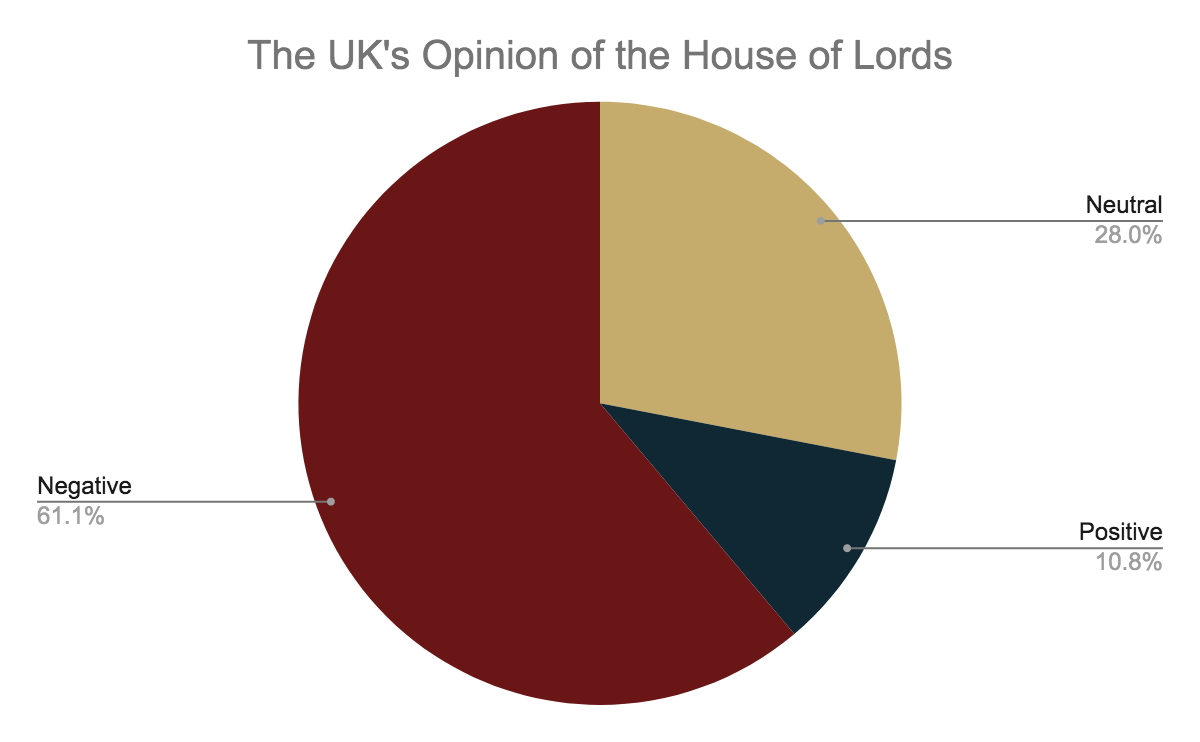
The table below shows the 10 most commonly used words to describe the House of Lords and their frequency:
| Word | Frequency |
| Waste (of time, money or space) | 84 |
| Old | 75 |
| Outdated | 70 |
| Unelected | 22 |
| Out of Touch | 21 |
| Useless | 20 |
| Rich | 17 |
| Boring | 14 |
| Corrupt | 13 |
| Unnecessary | 13 |
As you can see, the majority of people in the UK have a negative opinion of the House of Lords, with many describing it as “a waste of time”, “a waste of money” and “a waste of space”. Other frequently used descriptive terms included “old”, “outdated”, “out of touch” and “useless”, with “rich”, “boring”, “corrupt” and “unnecessary” also being used often.
Some of our favourite descriptions have got to be:
“For MPs who feel a bit tired and need a sleep for an hour or two.”
“A very expensive retirement home for MPs to keep on taking and getting overpaid for helping themselves, a den of thieves and pirates I could go on but that’s the gist of what I think”
“Funny at times”
“Repairable”
Gender Breakdown: How Many Women Are There in the House of Lords?
When the House of Lords was first established in the 11th century, it consisted of religious leaders and the monarch’s ministers, the vast majority of whom were men. However, our society has come a long way since then, so surely we can now expect a more even split?
Well, not quite yet. Our investigation found that:
- Only around a quarter of peers in the House of Lords are women.
- 72.1% of Lords are men and 27.9% are women.
- There are 811 members of the House of Lords and 585 of them are men, while 226 are women.
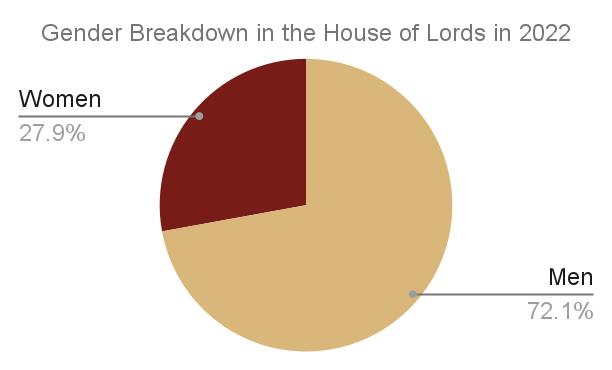
What is the Average Age of a Member of the House of Lords?
As of 2022, the average age of a member of the House of Lords is 71, with the average date of birth being 25th December 1950.
The oldest member of the House of Lords is Lord Christopher who is 97 years old having been born in 1925.
The youngest member is Lord Harlech who is 36 years of age, having been born in 1986.
Are All Lords Named John Smith?
Don’t be ridiculous, of course n… Oh wait. Actually, there are a lot of Johns and a lot of Smiths in the House of Lords!
What Are the Most Popular Men’s Names Amongst Lords?
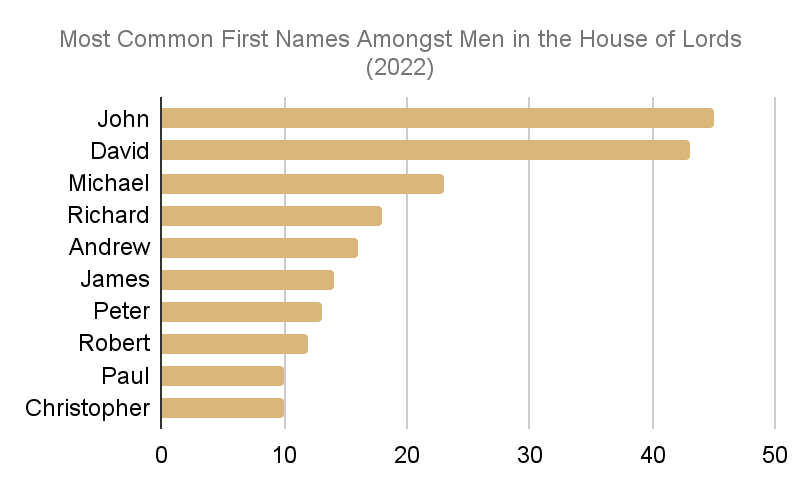
It turns out that the most common first names amongst peers are John and David, as there are 45 Johns and 43 Davids currently sitting in the House of Lords!
Other popular first names include Michael, Andrew, Richard and Robert for men.
How About the Most Popular Women’s Names?
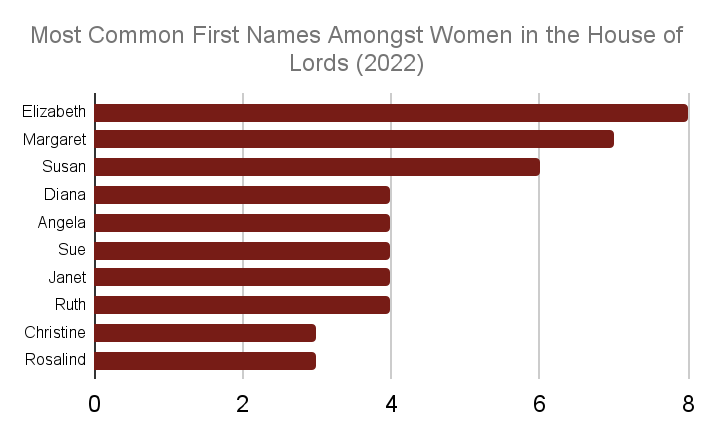
As you can see from the graph, the most popular first name amongst women in the House of Lords is Elizabeth, with 8 women having this name.
This is then followed by Margaret, Susan, Diana, Angela and Sue.
Which Surname is Most Common in the House of Lords?
When it comes to surnames, the one which occurs most often amongst Lords is Smith, held by 7 different peers.
This is then followed by Campbell, Davies and Taylor, alongside Morgan and Young.
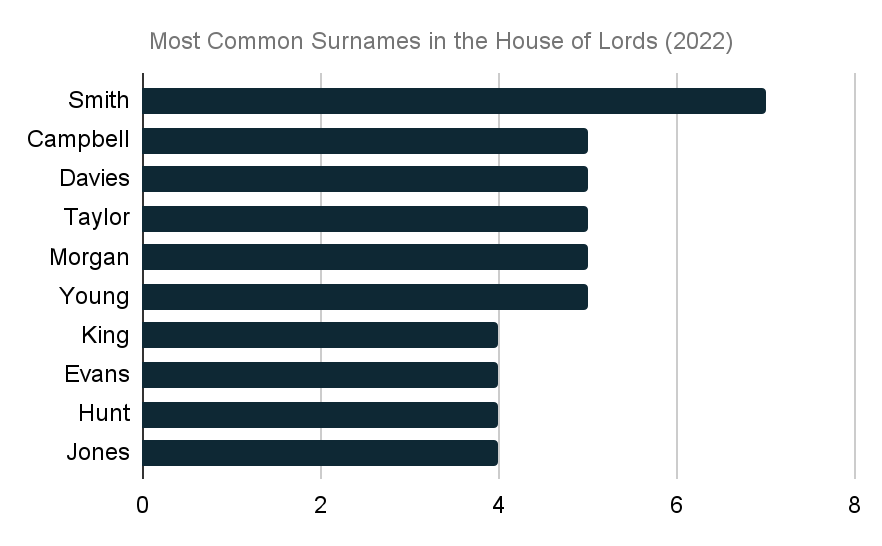
How Many Lords in the House of Lords Are Born Outside of the UK?
Perhaps unsurprisingly, the vast majority of those currently sitting or eligible to sit in the House of Lords are born in the UK.
In fact, 489 (86.4%) of Lords are UK-born, meaning that 80 (14.1%) are born elsewhere.
That’s down from 494 UK-born Lords in 2021.
Of those born outside of the UK, the countries that most non-UK members are born in are India (10) and Pakistan (10), followed by South Africa (5), Germany (4), Uganda (4), Tanzania (3) and Iran (3).
Which UK Cities are Most Lords Born in?
Overwhelmingly, the city that most Lords call their hometown is London, as 121 members (15%) were born in England’s capital.
This is followed by Liverpool (15), Glasgow (13) and Manchester (12).
| The Most Common Birthplaces of Lords | Count |
| London | 121 |
| Liverpool | 15 |
| Glasgow | 13 |
| Manchester | 12 |
House of Lords Political Party Affiliation Composition
Nearly a third of the House of Lords members currently sitting are part of the conservative party (266 individuals), making this the most common political party affiliation amongst Lords.
The second most popular political party is Labour as 176 members are affiliated with this party.
Whilst 84 peers are members of the Liberal Democrats party.
| Political Party Affiliation | Number of Lords |
| Conservative | 266 |
| Labour | 176 |
| Liberal Democrats | 84 |
| Green | 2 |
| Democratic Unionist Party | 5 |
| Plaid Cymru | 1 |
| Ulster Unionist Party | 2 |
What Type of Education Do You Need to Become a Lord?
Well, officially there are no educational prerequisites to becoming a member of the House of Lords. However looking at the statistics, it seems that those who received a private education are far more likely to earn this prestigious title.
In fact, 440 of the 632 members whose secondary education is known, went to a private school. That’s almost 70% of Lords.
This means that just 30% (192 members) attended a state secondary school.
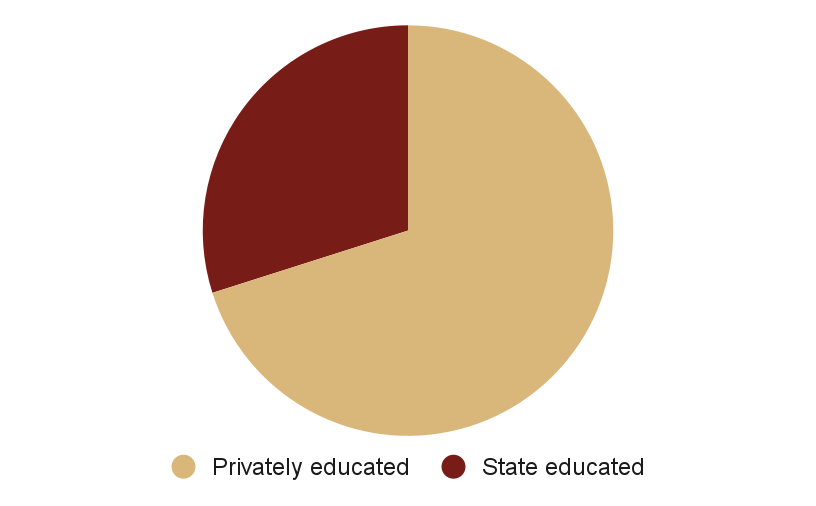
So now we know that far more Lords were privately educated than state educated. But is a university education compulsory for Lords?
Our analysis of demographic data from the House of Lords found that a staggering 95.3% of Lords have a university degree of some kind.
Leaving just 4.8% having not had a university education of some kind.
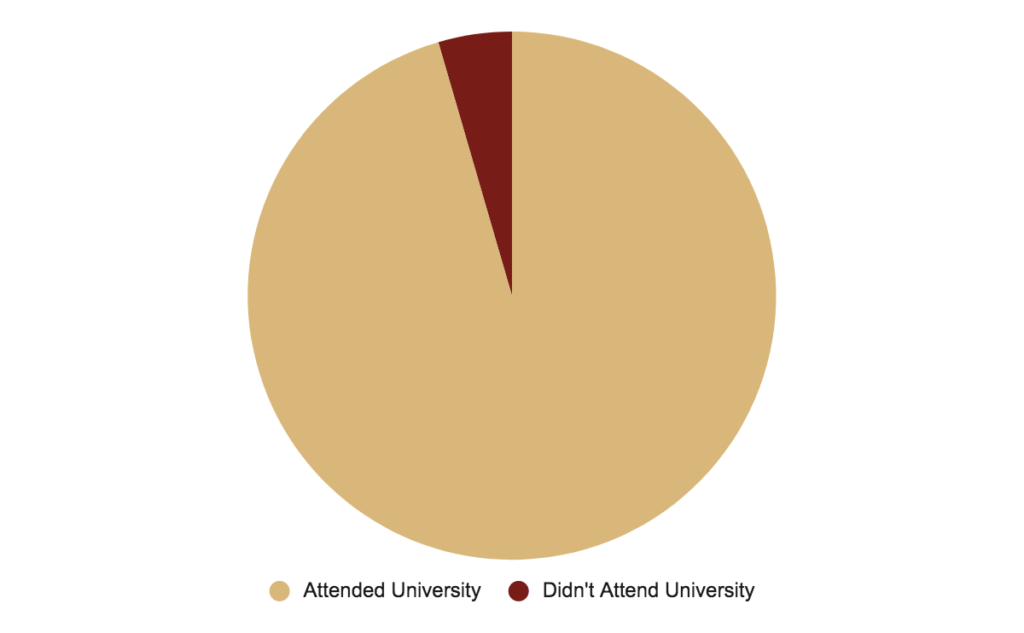
Marital Status and Children of the House of Lord Members
Are all Lords married? Or are they mainly single? Our analysis found that:
- 85% of members of the House of Lords are married.
- 4.3% of Lords are single.
- 3.33% are divorced and another 2.1% are widowed, with less than 1% of Lords being in a civil partnership.
So clearly the vast majority of Lords are married, but how many of them have children?
Our research found:
- The most common number of children for a Lord to have is 2.
- The Lord who has the most children is Lord Marks of Henley-on-Thames, as has 7 children.
Methodology
It’s important to note that all of the above statistics were based on known demographic details of each Lord. In some cases, data was unavailable. For instance, marital status information was only available for 633 out of the 811 Lords. So percentages and figures in this piece only refer to the percentage of known information.
Our full methodology can be found here.
How do you become a Lord?
Want to hear a secret? You don’t actually have to be born in London, privately educated and named John Smith or Archibald Hamilton to become a Lord. In fact, anyone can. Simply purchase a small plot of land (for as little as £30) in the stunning Scottish highlands and become a Lord you shall!
Not only will you own your very own land and have the bragging rights that come with this prestigious title, but also you’ll be able to go and visit your land anytime you like, and will receive a gift certificate and pack to confirm your new status.
To find out more about How to Become a Lord, head over to the Buy Your Land page at Highland Titles today.
What you should do next...
- Browse our plots to claim your title of Lord or Lady of the Glen
- Discover the masjetic Kilnaish Estate
- View our fun gifts and accessories, inspired by the Scottish Highlands